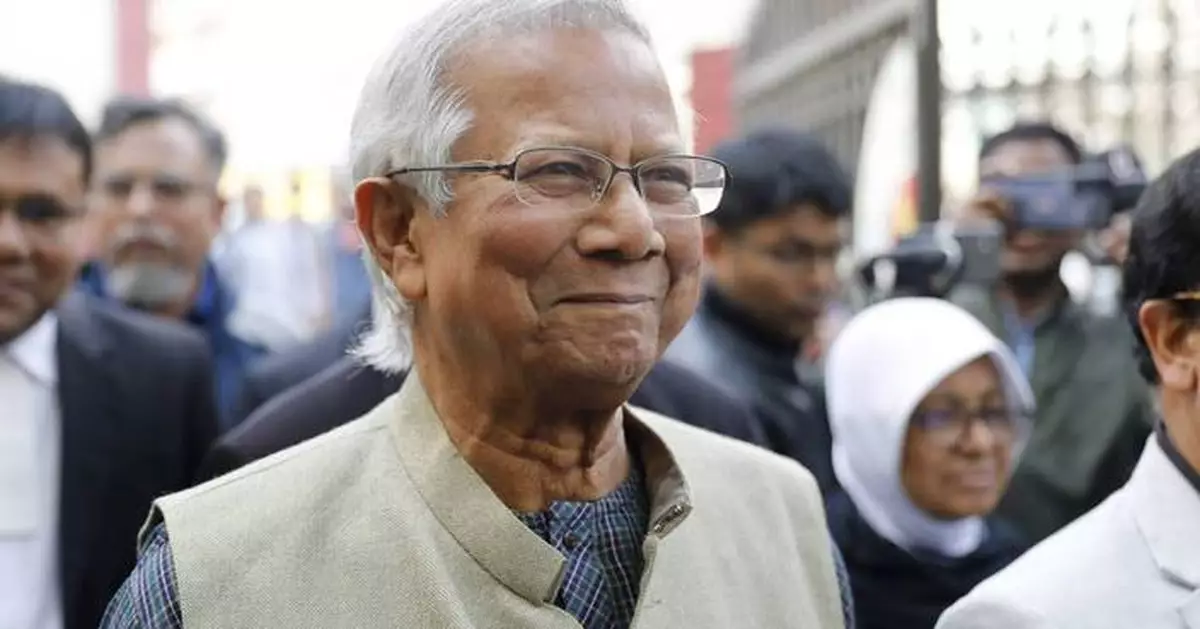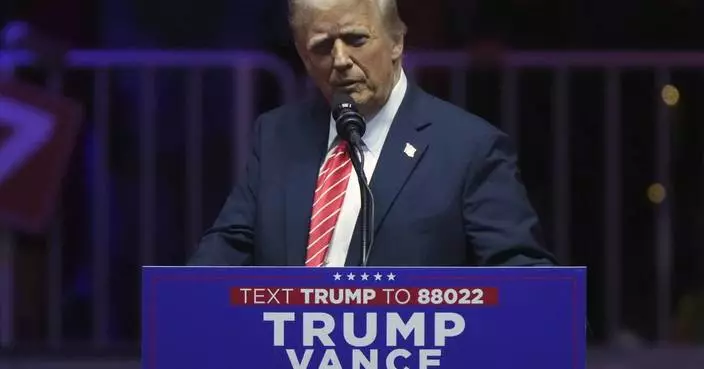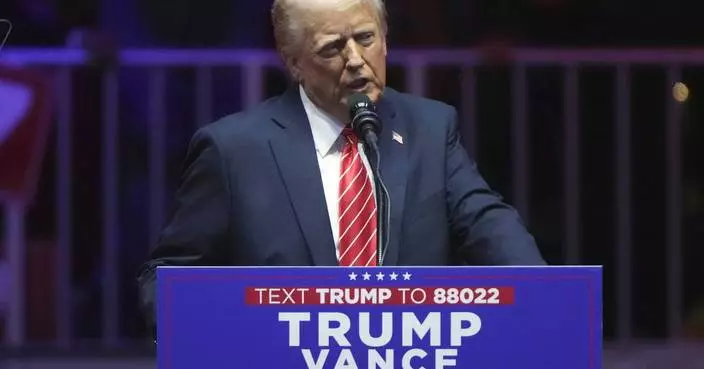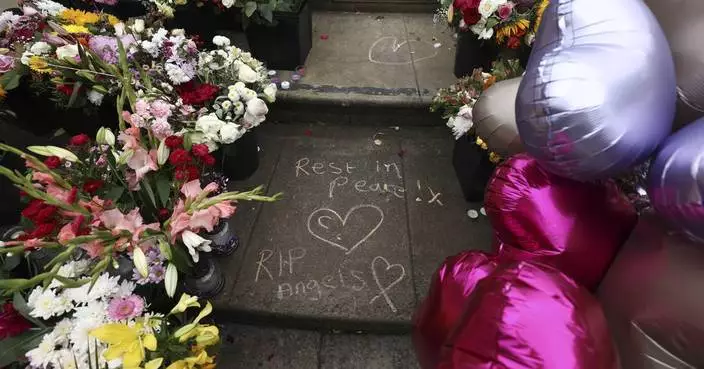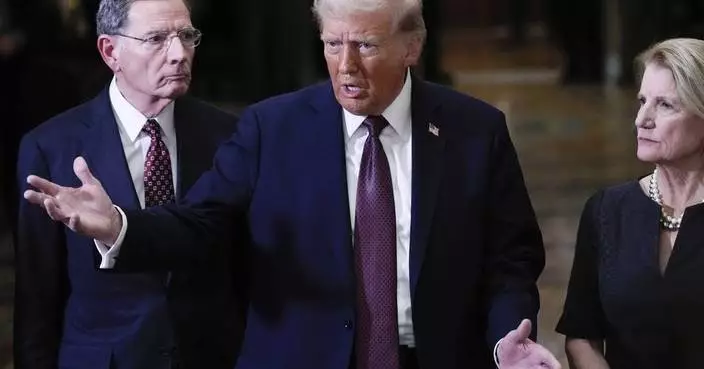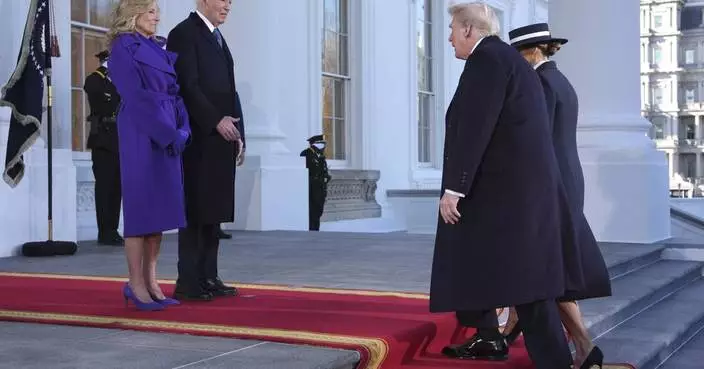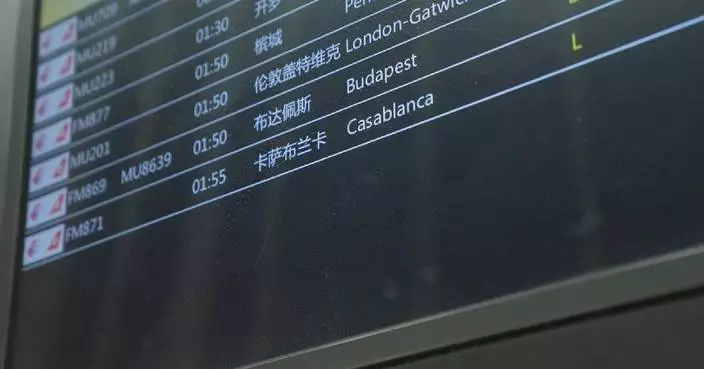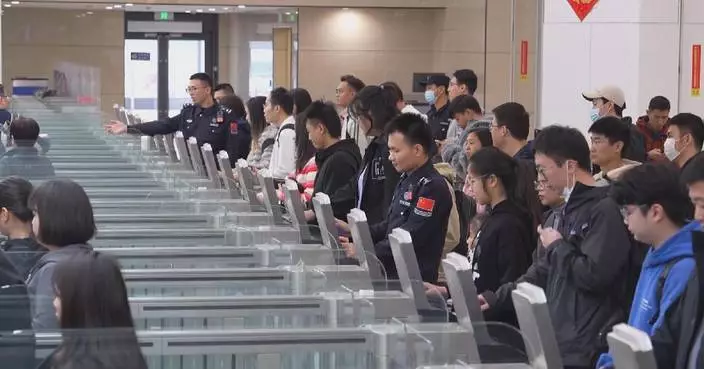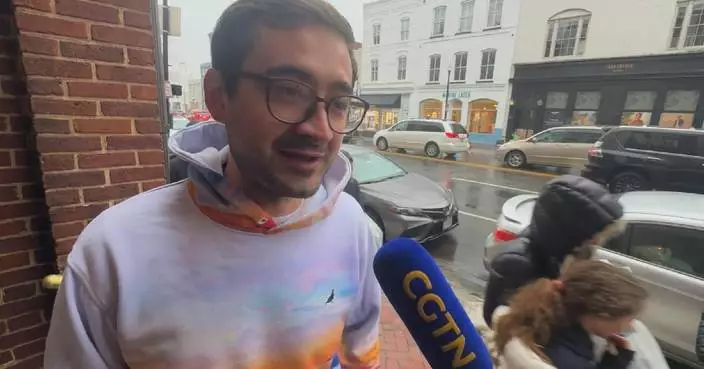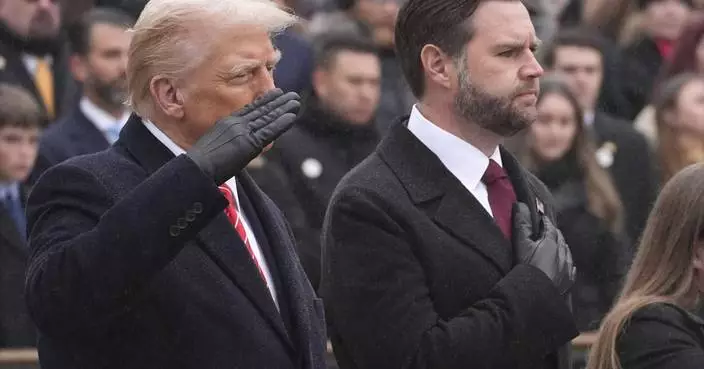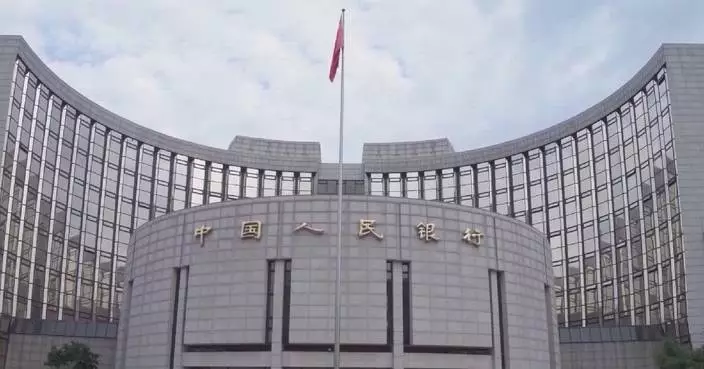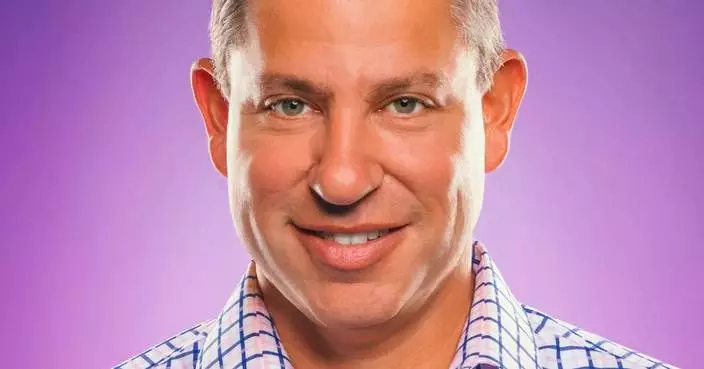DHAKA, Bangladesh (AP) — Nobel Peace Prize laureate Muhammad Yunus has been chosen to head Bangladesh’s interim government after the nation's longtime prime minister resigned and fled abroad in the face of a broad uprising against her rule.
Known as the “banker to the poorest of the poor” and a longtime critic of the ousted Sheikh Hasina, Yunus will act as a caretaker premier until new elections are held. The decision followed a meeting late Tuesday that included student protest leaders, military chiefs, civil society members and business leaders.
Click to Gallery
FILE- Muhammad Yunus, an economist from Bangladesh who founded the Grameen Bank and won a Nobel Peace Prize, is seen at the end of a press conference in Paris Monday Feb. 18, 2008. (AP Photo/Remy de la Mauviniere, File)
FILE- Professor Mohammed Yunus, founder of Grameen Bank, a micro credit institution, explains to villagers the benefits of the system at Kalampur village in Dhaka, Bangladesh, Jan. 21, 2004. (AP Photo/Pavel Rahman, File)
FILE- Nobel Peace Prize winners Muhammad Yunus, right, and Grameen Bank representative Mosammat Taslima Begum display their medals and diplomas at City Hall in Oslo, Norway Sunday Dec. 10, 2006. (AP Photo/John McConnico, File)
FILE- Nobel Peace Prize laureate Muhammad Yunus gestures after he was granted bail by a labor court in Dhaka, Bangladesh, Sunday, Jan. 28, 2024. (AP Photo/Mahmud Hossain Opu, File)
FILE- Nobel Peace Laureate Muhammad Yunus, Chairman of the Yunus Centre, speaks during a debate hosted by the Associated Press "Regions in Transformation: South Asia" at the World Economic Forum in Davos, Switzerland, Thursday, Jan. 21, 2016. (AP Photo/Michel Euler, File)
FILE- Nobel laureate Muhammad Yunus speaks to the media after he was granted bail by a court in an embezzlement case, in Dhaka, Bangladesh, Sunday, March 3, 2024. (AP Photo/Mahmud Hossain Opu, File)
FILE- Nobel Peace Prize laureate Muhammad Yunus smiles as he arrives to appear before a labor court in Dhaka, Bangladesh, Sunday, Jan. 28, 2024. (AP Photo/Mahmud Hossain Opu, File)
Hasina was forced to flee Monday after weeks of protests over a quota system for allocating government jobs turned into a broader challenge to her 15-year rule, which was marked by a rising economy but an increasingly authoritarian streak.
Hasina’s departure has plunged bangladesh into a political crisis. The army has temporarily taken control, but it is unclear what its role would be in an interim government after the president dissolved Parliament on Tuesday to pave the way for elections.
Student leaders who organized the protests have wanted Yunus, who is currently in Paris for the Olympics as an adviser to its organizers, to lead an interim government.
He could not immediately be reached for comment, but key student leader Nahid Islam asserted that Yunus agreed to step in during a discussion with them. The 83-year-old is a well-known critic and political opponent of Hasina.
Yunus called her resignation the country’s “second liberation day.” She once called him a “bloodsucker.”
An economist and banker by profession, Yunus was awarded the Nobel Peace Prize in 2006 for pioneering the use of microcredit to help impoverished people, particularly women. The Nobel Peace Prize committee credited Yunus and his Grameen Bank “for their efforts to create economic and social development from below.”
Yunus founded Grameen Bank in 1983 to provide small loans to entrepreneurs who would not normally qualify to receive them. The bank’s success in lifting people out of poverty led to similar microfinancing efforts in other countries.
He ran into trouble with Hasina in 2008, when her administration launched a series of investigations into him. He had announced he would form a political party in 2007 when the country was run by a military-backed government but did not follow through.
During the investigations, Hasina accused Yunus of using force and other means to recover loans from poor rural women as the head of Grameen Bank. Yunus denied the allegations.
Hasina’s government began reviewing the bank’s activities in 2011, and Yunus was fired as managing director for allegedly violating government retirement regulations. He was put on trial in 2013 on charges of receiving money without government permission, including his Nobel Prize and royalties from a book.
He later faced more charges involving other companies he created, including Grameen Telecom, which is part of the country’s largest mobile phone company, GrameenPhone, a subsidiary of Norwegian telecom giant Telenor. In 2023, some former Grameen Telecom workers filed a case against Yunus accusing him of siphoning off their job benefits. He denied the accusations.
Earlier this year, a special judge’s court in Bangladesh indicted Yunus and 13 others on charges over the $2 million embezzlement case. Yunus pleaded not guilty and is out on bail for now.
Yunus' supporters say he has been targeted because of his frosty relations with Hasina.
Yunus was born in 1940 in Chittagong, a seaport city in Bangladesh. He received his PhD from Vanderbilt University in the United States and taught there briefly before returning to Bangladesh.
In a 2004 interview with The Associated Press, Yunus said he had a “eureka movement” to establish Grameen Bank when he met a poor woman weaving bamboo stools who was struggling pay her debts.
“I couldn’t understand how she could be so poor when she was making such beautiful things,” he recalled in the interview.
Saaliq reported from New Delhi.
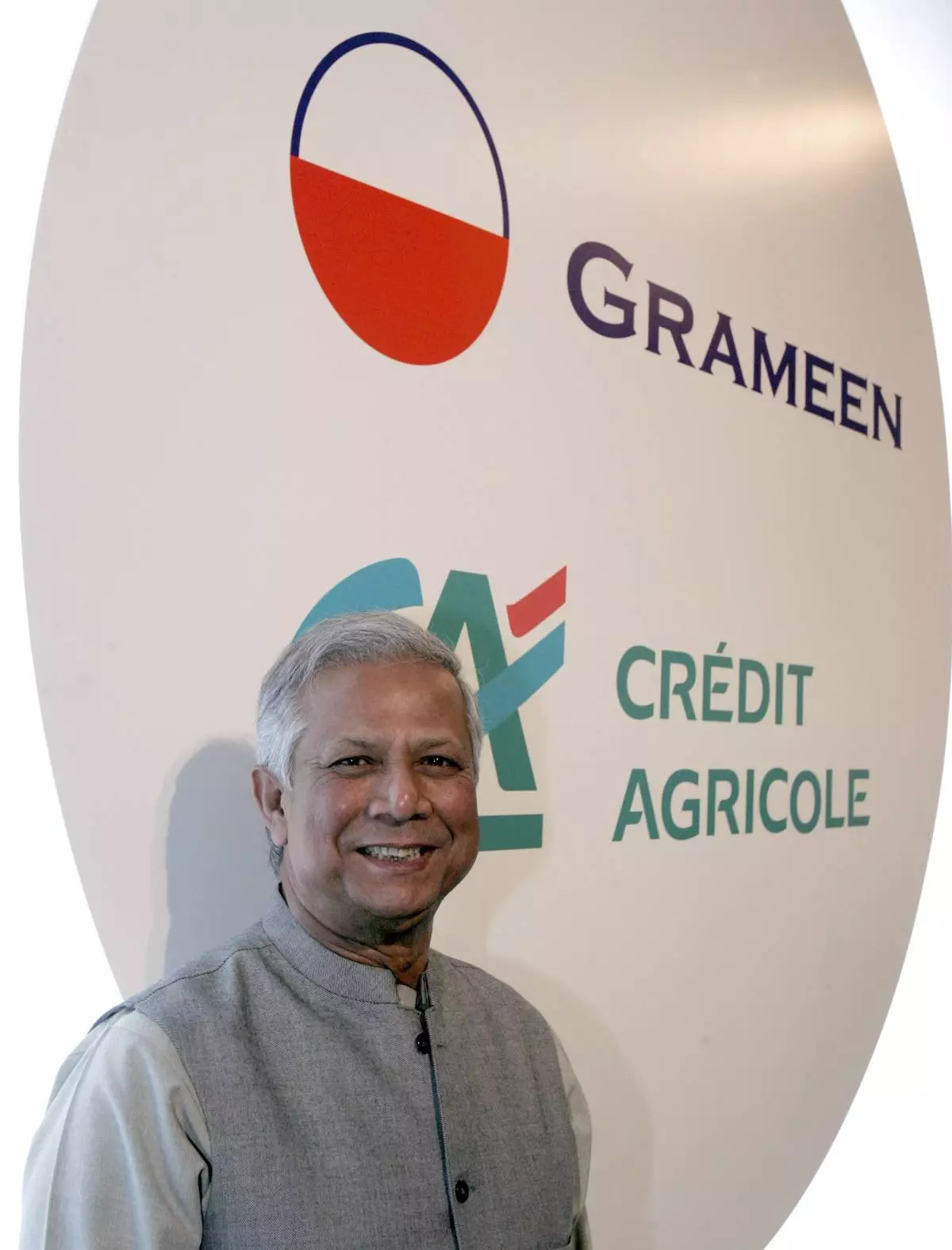
FILE- Muhammad Yunus, an economist from Bangladesh who founded the Grameen Bank and won a Nobel Peace Prize, is seen at the end of a press conference in Paris Monday Feb. 18, 2008. (AP Photo/Remy de la Mauviniere, File)
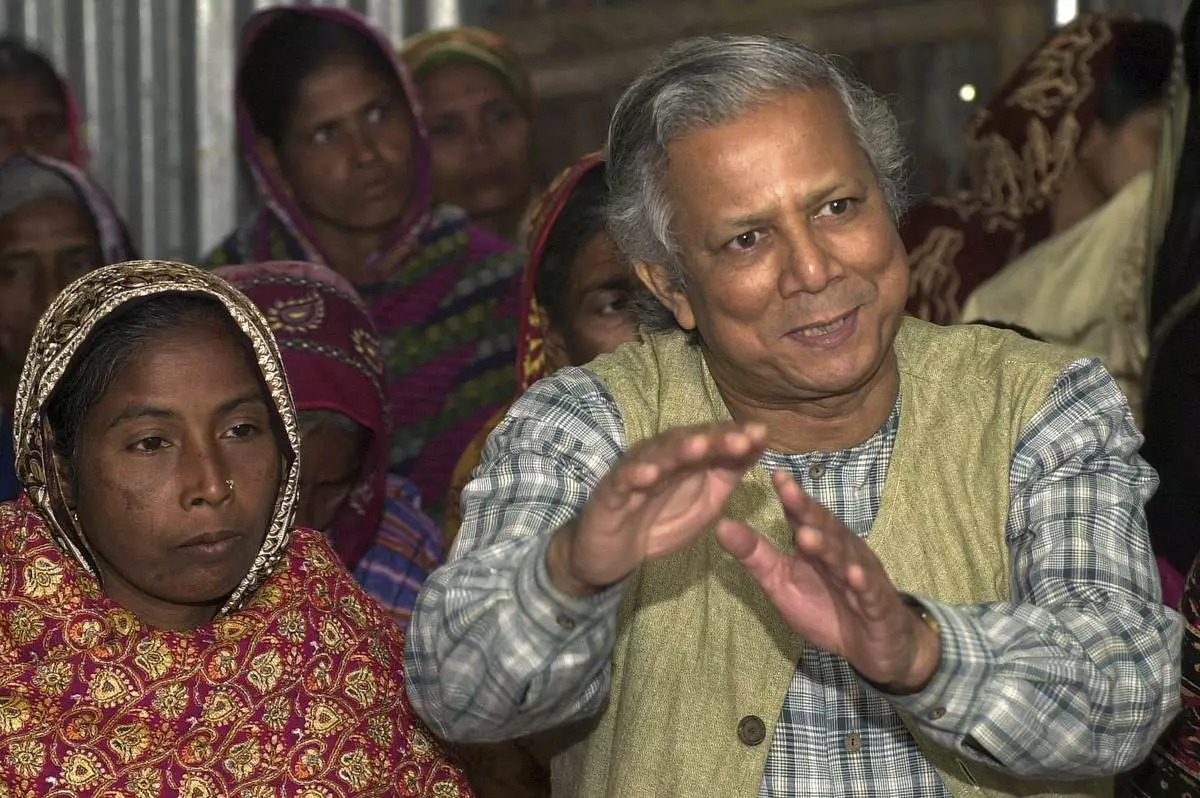
FILE- Professor Mohammed Yunus, founder of Grameen Bank, a micro credit institution, explains to villagers the benefits of the system at Kalampur village in Dhaka, Bangladesh, Jan. 21, 2004. (AP Photo/Pavel Rahman, File)
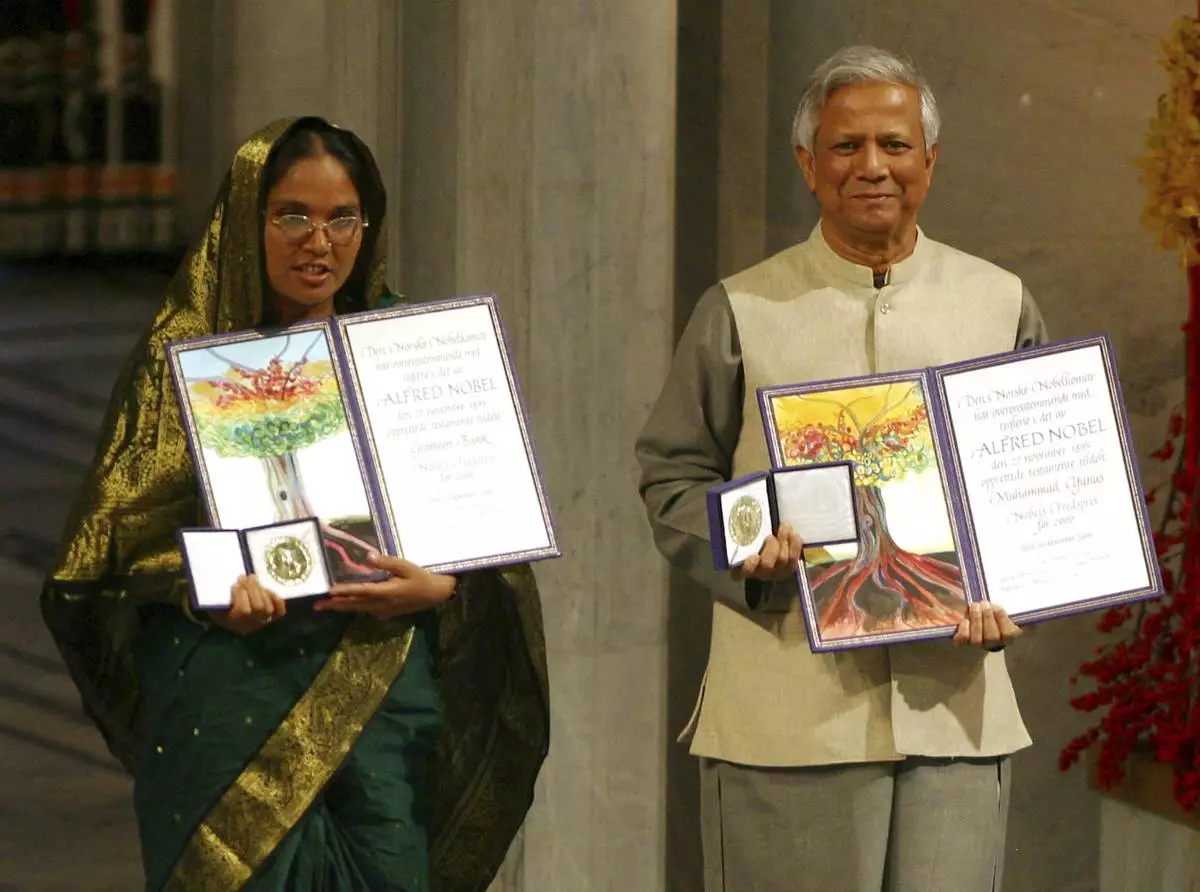
FILE- Nobel Peace Prize winners Muhammad Yunus, right, and Grameen Bank representative Mosammat Taslima Begum display their medals and diplomas at City Hall in Oslo, Norway Sunday Dec. 10, 2006. (AP Photo/John McConnico, File)
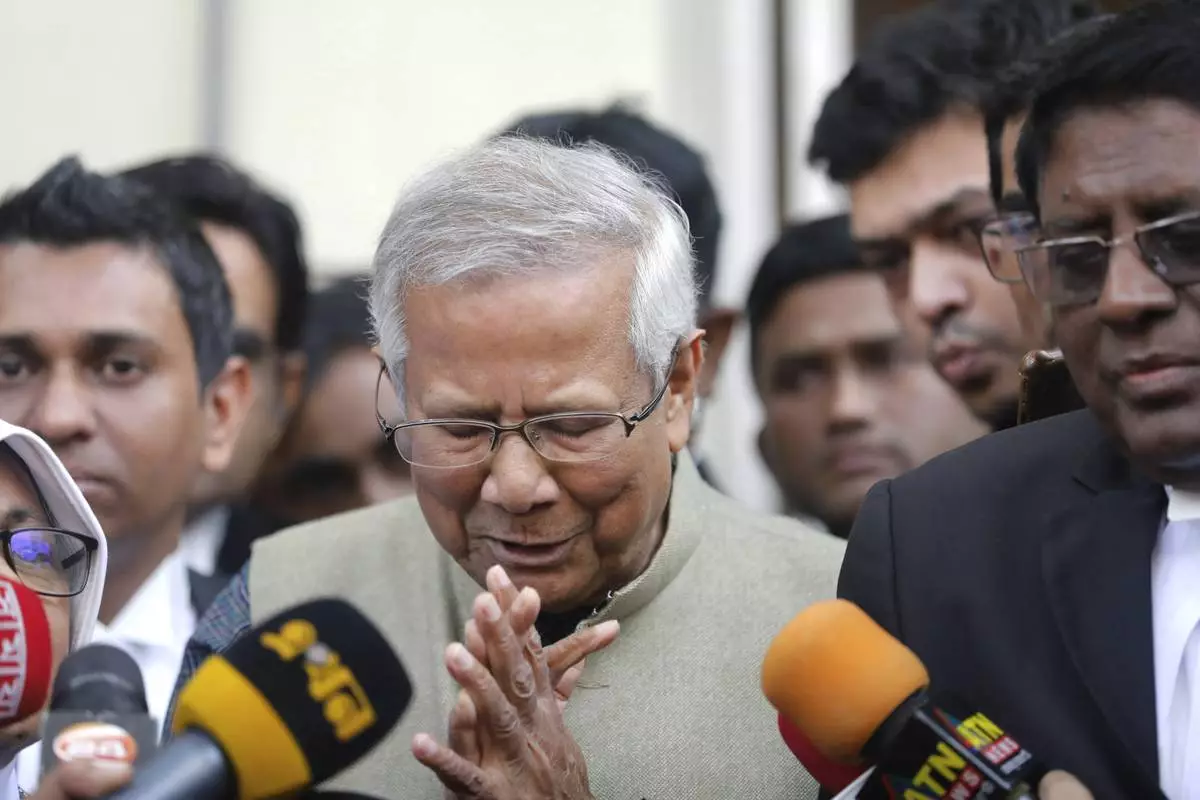
FILE- Nobel Peace Prize laureate Muhammad Yunus gestures after he was granted bail by a labor court in Dhaka, Bangladesh, Sunday, Jan. 28, 2024. (AP Photo/Mahmud Hossain Opu, File)
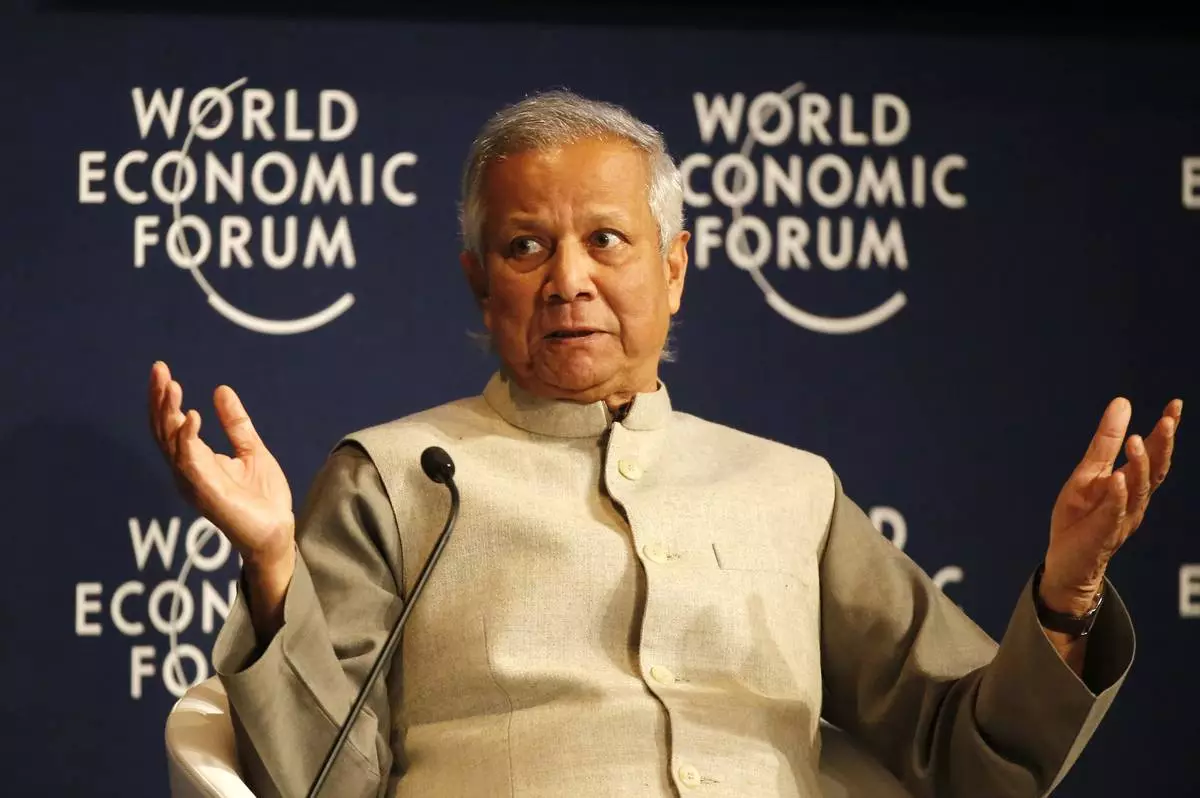
FILE- Nobel Peace Laureate Muhammad Yunus, Chairman of the Yunus Centre, speaks during a debate hosted by the Associated Press "Regions in Transformation: South Asia" at the World Economic Forum in Davos, Switzerland, Thursday, Jan. 21, 2016. (AP Photo/Michel Euler, File)
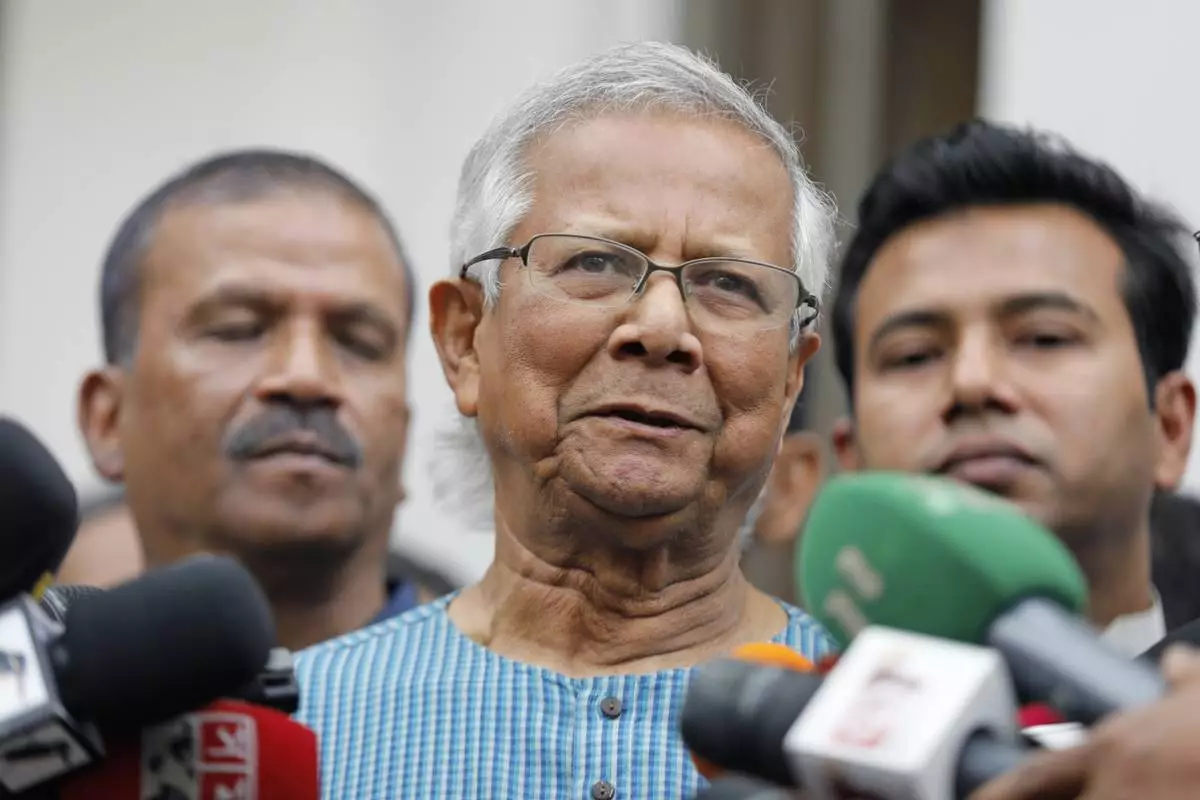
FILE- Nobel laureate Muhammad Yunus speaks to the media after he was granted bail by a court in an embezzlement case, in Dhaka, Bangladesh, Sunday, March 3, 2024. (AP Photo/Mahmud Hossain Opu, File)
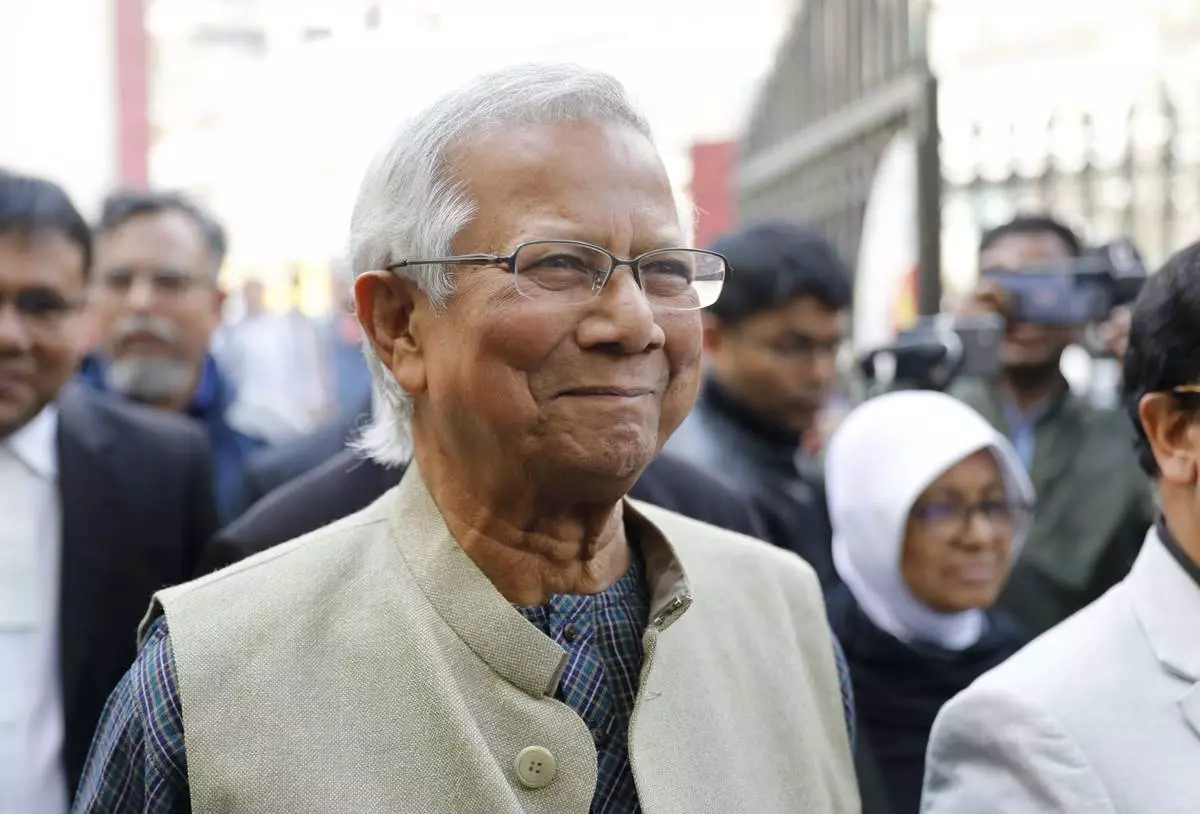
FILE- Nobel Peace Prize laureate Muhammad Yunus smiles as he arrives to appear before a labor court in Dhaka, Bangladesh, Sunday, Jan. 28, 2024. (AP Photo/Mahmud Hossain Opu, File)
WASHINGTON (AP) — The price of bitcoin surged to over $109,000 early Monday, just hours ahead of President-elect Donald Trump’s inauguration, as a pumped up cryptocurrency industry bets he'll take action soon after returning to the White House.
Once a skeptic who said a few years ago that bitcoin “ seems like a scam,” Trump has embraced digital currencies with a convert’s zeal. He's launched a new cryptocurrency venture and vowed on the campaign trail to take steps early in his presidency to make the U.S. into the “crypto capital” of the world.
His promises including creating a U.S. crypto stockpile, enacting industry-friendly regulation and event appointing a crypto “czar” for his administration.
“You’re going to be very happy with me,” Trump told crypto-enthusiasts at a bitcoin conference last summer.
Bitcoin is the world’s most popular cryptocurrency and was created in 2009 as a kind of electronic cash uncontrolled by banks or governments. It and newer forms of cryptocurrencies have moved from the financial fringes to the mainstream in wild fits and starts.
The highly volatile nature of cryptocurrencies as well as their use by criminals, scammers and rogue nations, has attracted plenty of critics, who say the digital currencies have limited utility and often are just Ponzi schemes.
But crypto has so far defied naysayers and survived multiple prolonged price drops in its short lifespan. Wealthy players in the crypto industry, which felt unfairly targeted by the Biden administration, spent heavily to help Trump win November’s election. Bitcoin has surged in price since Trump's victory, topping $100,000 for the first time last month before briefly sliding down to about $90,000. On Friday, it rose about 5%. It jumped more than $9,000 early Monday, according to CoinDesk.
Two years ago, bitcoin was trading at about $20,000.
Trump’s picks for key cabinet and regulatory positions are stocked with crypto supporters, including his choice to lead the Treasury and Commerce departments and the head of the Securities and Exchange Commission.
Key industry players held a first ever "Crypto Ball” on Friday to celebrate the first “crypto president." The event was sold out, with tickets costing several thousand dollars.
Here’s a look at some detailed action Trump might take in the early days of his administration:
As a candidate Trump promised that he would create a special advisory council to provide guidance on creating “clear” and “straightforward” regulations on crypto within the first 100 days of his presidency.
Details about the council and its membership are still unclear, but after winning November’s election, Trump named tech executive and venture capitalist David Sacks to be the administration’s crypto “czar.” Trump also announced in late December that former North Carolina congressional candidate Bo Hines will be the executive director of the “Presidential Council of Advisers for Digital Assets.”
At last year’s bitcoin conference, Trump told crypto supporters that new regulations “will be written by people who love your industry, not hate your industry.” Trump's pick to lead the SEC, Paul Atkins, has been a strong advocate for cryptocurrencies.
Crypto investors and companies chafed as what they said was a hostile Biden administration that went overboard in unfair enforcement actions and accounting policies that have stifled innovation in the industry — particularly at the hands of outgoing SEC Chairman Gary Gensler.
“As far as general expectations from the Trump Administration, I think one of the best things to bet on is a tone change at the SEC,” said Peter Van Valkenburgh, the executive director of the advocacy group Coin Center.
Gensler, who is set to leave as Trump takes office, said in a recent interview with Bloomberg that he’s proud of his office’s actions to police the crypto industry, which he said is “rife with bad actors.”
Trump also promised that as president he’ll ensure the U.S. government stockpiles bitcoin, much like it already does with gold. At the bitcoin conference earlier this summer, Trump said it the U.S. government would keep, rather than auction off, the billions of dollars in bitcoin it has seized through law enforcement actions.
Crypto advocates have posted a draft executive order online that would establish a “Strategic Bitcoin Reserve” as a “permanent national asset” to be administered by the Treasury Department through its Exchange Stabilization Fund. The draft order calls for the Treasury Department to eventually hold at least $21 billion in bitcoin.
Republican Sen. Cynthia Lummis of Wyoming has proposed legislation mandating the U.S. government stockpile bitcoin, which advocates said would help diversify government holdings and hedge against financial risks. Critics say bitcoin’s volatility make it a poor choice as a reserve asset.
Creating such a stockpile would also be a “giant step in the direction of bitcoin becoming normalized, becoming legitimatized in the eyes of people who don’t yet see it as legitimate,” said Zack Shapiro, an attorney who is head of policy at the Bitcoin Policy Institute.
At the bitcoin conference earlier this year, Trump received loud cheers when he reiterated a promise to commute the life sentence of Ross Ulbricht, the convicted founder of the drug-selling website Silk Road that used crypto for payments.
Ulbricht’s case has energized some crypto advocates and Libertarian activists, who believe government investigators overreached in building their case against Silk Road.
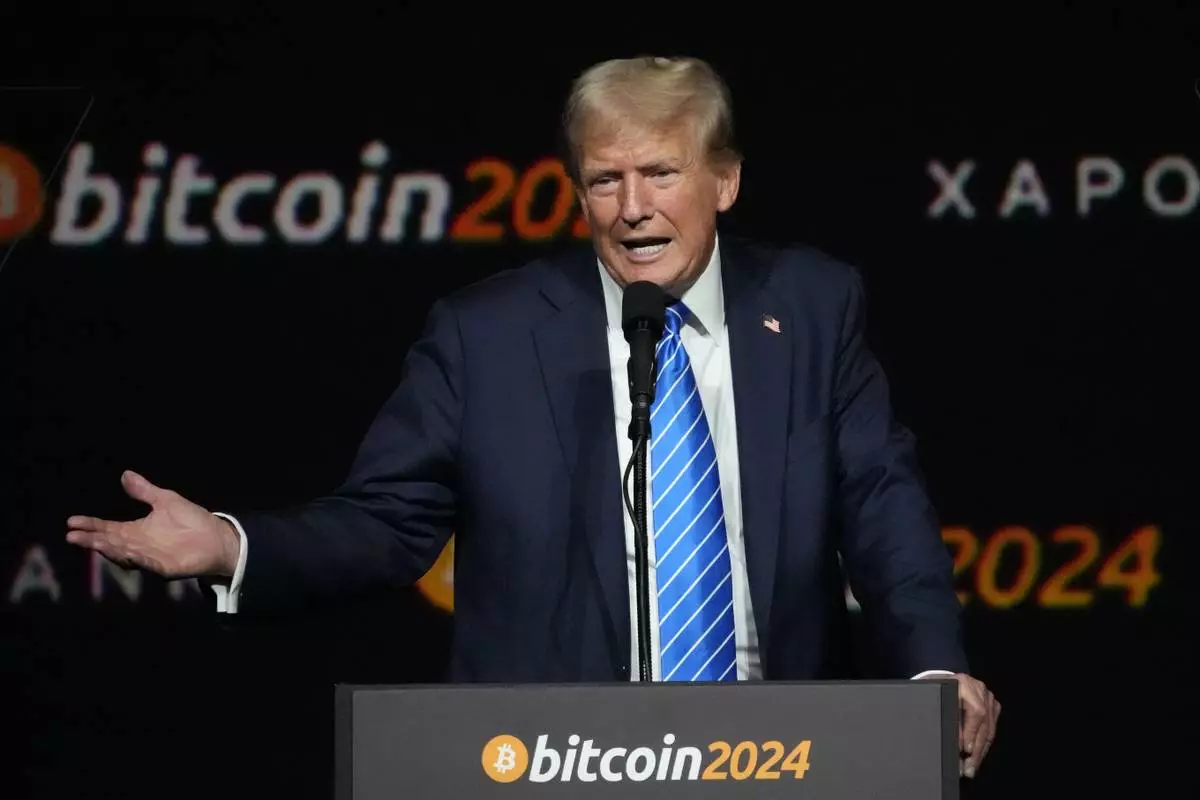
FILE - Donald Trump speaks at the Bitcoin 2024 Conference July 27, 2024, in Nashville, Tenn. (AP Photo/Mark Humphrey, File)









